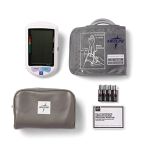Women’s Heart Week: Heart Disease Signs, Risks, Prevention & Library Resources
Posted on February 1, 2023 at 6:00 am

By Crystal Miller
Women’s Heart Week
Organized by the Women’s Heart Foundation, Women’s Heart Week is celebrated each year February 1–7 and aims to educate, raise awareness, and teach the symptoms and preventions of serious heart diseases in women.
According to both the Women’s Heart Foundation and the Centers for Disease Control and Prevention (CDC), heart disease is the number one killer of American women.
The Women’s Heart Foundation shares: “Recognizing symptoms and risks, making lifestyle changes, and getting timely care can save a woman’s life.”
According to the CDC’s Women and Heart Disease web page, “The term heart disease refers to several types of heart conditions, including coronary artery disease and heart attack. Although heart disease is sometimes thought of as a man’s disease, almost as many women as men die each year of heart disease in the United States.”
And despite increases in awareness over the past decades, the CDC says only 56 percent of women realize that heart disease is the number one cause of death in women.
In the United States, 314,186 women died from heart disease in 2020, which was about 1 in 5 female deaths.
Know the Signs
According to the Mayo Clinic, “the most common heart attack symptom in women is the same as in men—some type of chest pain, pressure, or discomfort… But chest pain is not always severe or even the most noticeable symptom, particularly in women. Women often describe heart attack pain as pressure or tightness.”
The Mayo Clinic shares that “women are more likely than men to have heart attack symptoms unrelated to chest pain.” These symptoms include:
- Neck, jaw, shoulder, upper back, or upper belly (abdomen) discomfort
- Shortness of breath
- Pain in one or both arms
- Nausea or vomiting
- Sweating
- Lightheadedness or dizziness
- Unusual fatigue
- Heartburn (indigestion)
“Because women’s heart attack symptoms can differ from men’s, women might be diagnosed less often with heart disease than are men,” the Mayo Clinic warns, also sharing that “women are more likely than men to have a heart attack with no severe blockage in an artery. This is called nonobstructive coronary artery disease.”
Prevention: Reducing Your Risk
Here are suggestions from the CDC to reduce your risk of heart disease (includes additional information):
- Know your blood pressure. Having uncontrolled blood pressure can lead to heart disease. High blood pressure has no symptoms, so it’s important to have your blood pressure checked regularly.
- Talk to your doctor or health care team about whether you should be tested for diabetes. Having uncontrolled diabetes raises your risk of heart disease.
- Quit smoking. If you don’t smoke, don’t start. If you do smoke, learn ways to quit.
- Discuss checking your blood cholesterol and triglycerides with your doctor.
- Make healthy food choices. Having overweight or obesity raises your risk of heart disease.
- Limit how much alcohol you drink to one drink a day.
- Manage stress levels by finding healthy ways to cope with stress.
- Be physically active. Try to get at least 2 hours and 30 minutes of physical activity each week. Not getting enough physical activity can lead to heart disease.
Library Books & Materials
Our collection has books and other materials to help you learn about and monitor heart health as well as discover new ways to get physically active.
In our Library of Things collection, you can check out a Blood Pressure Monitor Kit for 4 weeks to track your blood pressure.
Check Out Washington: Discover Pass backpacks are a great way find adventures and new experiences in Washington State Parks. The backpack includes binoculars, field guides, and a special Discover Pass for parking at Washington State Parks.
You can check out books and DVDs from our collection that have information on ways to improve your heart health, no matter your age.
- The Mediterranean Method: Your Complete Plan to Harness the Power of the Healthiest Diet on the Planet—Lose Weight, Prevent Heart Disease, and More!, by Steven Masley
- Healthy Heart, Healthy Brain: The Proven Personalized Path to Protect Your Memory, Prevent Heart Attacks and Strokes, and Avoid Chronic Illness, by Bradley Bale
- Stay Off My Operating Table: A Heart Surgeon’s Metabolic Health Guide to Lose Weight, Prevent Disease, and Feel Your Best Every Day, by Phillip Ovadia
- The New American Heart Association Cookbook, by American Heart ASsociation
- Qi Gong for a Healthy Heart [DVD], by David Silver
- True Wellness for Your Heart: Combine the Best of Western and Eastern Medicine for Optimal Heart Health, by Catherine Kurosu
If you’re looking to add to your recipe collection, you can also check out the OverDrive booklist Mediterranean Yum!, available in the Libby app. It is full of cookbooks featuring the Mediterranean diet.
Library Programs
SCLD is offering a few different programs that can help you work on increasing your heart health through exercise and movement. You can try Chair Yoga, guided hikes around Spokane County, and a Zumba Class in Spanish.
Chair Yoga
For adults
MEDICAL LAKE
Saturday, Feb 4, 10:30am
OTIS ORCHARDS
Tuesday, Feb 28, 10:30am
DEER PARK
Thursday, Mar 30, 10:30am
ARGONNE
Tuesday, Apr 11, 10:30am
Learn more about Chair Yoga on our events calendar.
Salmonopolis: An Ecological Story of the Little Spokane River
Two-part program: lecture & hike
For adults
NORTH SPOKANE
Lecture
Friday, Apr 14, 5pm
WAIKIKI SPRINGS TRAILHEAD
Hike
Saturday, Apr 15, 9am or 12:30pm
Learn more about this lecture and hike on our events calendar.
Medical Lake Geo Walk & Water Sampling
For adults, teens & tweens
WATERFRONT PARK (MEDICAL LAKE)
Saturday, Apr 15, 1pm
Learn more about this geo walk on our events calendar.
Saltese Uplands: A Decade-Long Conservation Story
Two-part program: lecture & hike
For adults
OTIS ORCHARDS
Lecture
Saturday, May 6, 10am
SALTESE UPLANDS CONSERVATION AREA
Hike
Saturday, May 13, 9am
Learn more about this lecture and hike on our events calendar.
Clase de zumba / Zumba Class in Spanish
Programa para adultos / For adults
NORTH SPOKANE
Saturday, Mar 4, 11 & 18, 3:30pm
Learn more about the Zumba classes on our events calendar.
Q&A About Heart Health
I was able to interview Dr. Shyam Parekh, a local cardiac anesthesiologist, regarding women’s heart health and his experience working in a Spokane hospital during COVID.
Crystal: Do you see more men or women at your hospital going in for cardiac procedures?
Dr. Parekh: In general, we see more men with cardiovascular disease. Men take on riskier behavior. That’s precisely the problem, we don’t see as many women, there is a preconceived notion that if a woman comes in with some sort of vague discomfort in their chest, it is much more likely they will be told it’s not cardiac related (even if it is). Women tend to be often overlooked regarding the severity of disease. Their complaints are often just thought to be non-specific—heartburn, acid reflux disease, etc.
Crystal: Should women be getting screened for cardiovascular disease?
Dr. Parekh: Screening makes sense if you meet screening criteria, such as smoking, diabetes, and family history. If you have risk factors, your primary care provider should identify those and guide you through what screening and testing to take for preventative care based on guidelines for testing and screening. For people with symptoms, you need to advocate for yourself. For example, if you have shortness of breath with exertion, make sure someone is listening to what you’re describing.
The most common issues we see in female patients are aortic valve disease, coronary disease, and carotid arteries.
Crystal: What advice do you have for hearth health?
Dr. Parekh: The Mediterranean diet is fantastic. Eat less red meat, quit smoking, check your cholesterol profile, lose weight, and control blood sugar. Exercise—it’s easy to know, harder to implement.
One thing that is unique to women is making sure when you have a complaint of symptoms, that someone is listening and taking you seriously regarding cardiovascular health. Some women feel like they aren’t in the position to question their physician when they aren’t responding to their concerns.
With heart issues, early treatment means you can save some of the organ. The muscle doesn’t grow back.
Crystal Miller is a Business and Career Development Librarian at Spokane County Library District as well as the Community Librarian for Cheney Library, creating library programs, connecting with the Cheney community, and supporting local businesses and job seekers. In her free time, she enjoys her daily walks with her two dogs, trying out new recipes, and listening to audiobooks on the Libby app!
Tags: adults, blood pressure, blood pressure monitor, books, heart disease, heart health, walking, women, zumba



